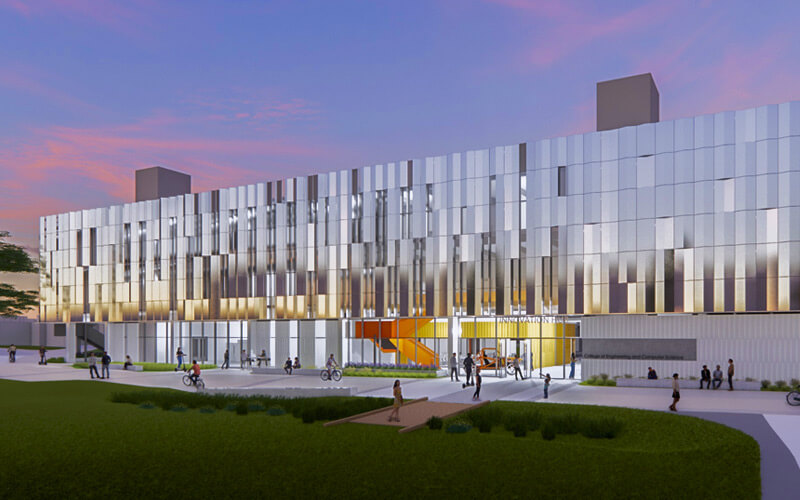
Cal State Fullerton’s new ECS Innovation Hub to expand and elevate engineering and computer science programs has been approved by the California State University Board of Trustees.
“Having the CSU Trustees’ approval to move forward with building the ECS Innovation Hub is a meaningful step in the right direction,” said Susan Barua, dean of the College of Engineering and Computer Science. “We are excited about the impact it will have on the lives of our current and future students.”
CSUF President Ronald S. Rochon, who presented the project to the board at the Sept. 25 meeting, said that the project is an investment in the future of the university’s graduates and the engineering and technologically-driven industries they will lead.
“It’s imperative to provide students with the resources, intellectual environment and opportunities that will enable them to thrive,” Rochon said.
“The Innovation Hub will do just that; it will be a state-of-the-art facility to foster collaboration, creativity and cutting-edge research. Market trends show a growing demand for engineering and computer science professionals, not just in California but across the globe.”
The university received a $67.5 million investment from the state for the project’s first phase, with philanthropic efforts underway to expand, enhance and support programming.

Barua said the new academic building will provide equitable learning opportunities, enrich pathways to student success, continue to attract a more diverse student body and help diversify the engineering and technology workforce — in terms of gender and ethnicity.
“Our college is a major player in preparing Orange County’s workforce,” she said. “The new Hub will strengthen and grow career pathways critical to the ever-evolving change we’re seeing in our world.”
Over the past 15 years, there has been a 215% increase in the college’s enrollment growth — from 1,900 to nearly 6,000 students. In the last two years, the college has seen a 30% increase in enrollment. Projections show the college growing as much as 9% annually, which could mean more than 8,000 students by the 2028-29 academic year, Barua said.
With 82% of the college’s graduates working in the region after graduation, the ECS Innovation Hub has the potential to address the region’s need for software developers, cybersecurity, computer hardware and tech professionals, and specialized engineers.
With shared student success interests in mind, Rochon said the project has the support of industry giants like the Disneyland Resort and Southern California Edison, local businesses, school districts, and Black and Hispanic organizations.

Barua shared that the engineering and computer science complex has not kept pace with the college’s programs and instructional advancements, with additional classrooms and labs needed to meet the current student enrollment.
The college’s two existing towers were built decades ago: The Engineering Building in 1971 and the Computer Science Building opened in 1989.
The three-story, 45,000-square-foot ECS Innovation Hub will be built west of the Engineering Building and adjacent to the lawn area. The building design features glass and steel exterior materials, with the appearance of a building lifted from the ground.
“We’ve been working around the clock to ensure not only this new space elevates our students, but the programming delivered in all our buildings is transformational as well,” Barua said. “Through engaged learning and holistic student experience, the space will drive opportunity through adaptive, community-based and inclusive innovation.”
Building highlights include learning labs for hands-on student research and projects, focusing on cybersecurity, advanced manufacturing, bioengineering and navigation. The new building will also have a 120-seat multipurpose space, a wellness room and shared spaces for student lounges, study areas, offices and meetings.

“The new building is designed for flexibility and maximum utilization, with spaces organized by function, allowing them to adapt to evolving industry and workforce needs rather than being assigned to specific departments,” said Sarab Singh, associate vice president for capital programs and facilities management.
Singh added that the outdoor hardscape and landscape areas will offer students more opportunities to study and collaborate.
The building also has sustainability features to manage daylight, glare and heat, touting all-electric, energy-efficient systems and generation, reduced water use for plumbing fixtures and a drought-tolerant landscape.
The next steps include finalizing construction plans by the end of this year, with construction beginning in May 2025 and completion projected by fall 2027.

Plans are underway to partner with alumni, the community and industry through philanthropic investments to deliver a state-of-the-art building and build momentum for the future phase, said Michael Karg, senior executive director of development.
A second phase has the potential to add 100,000 square feet to bring the college in line with current and future enrollment.
“The Innovation Hub allows us to step into an accelerated pace of change and put our shared values on full display — innovation, following your passions, inclusion, opportunity, excellence and exploration of the new frontiers of technology,” Karg said.
“Investing in our spaces doesn’t just spur change within Cal State Fullerton; its reach extends beyond our campus into the communities around us, our city, our state and the world.”
For more information about donating to support the ECS Innovation Hub, contact Karg at mkarg@fullerton.edu.